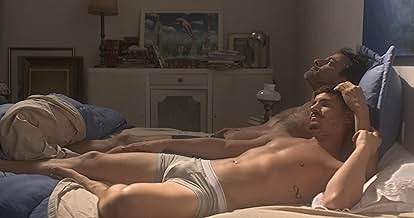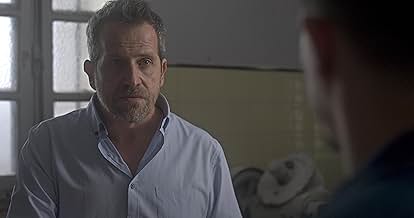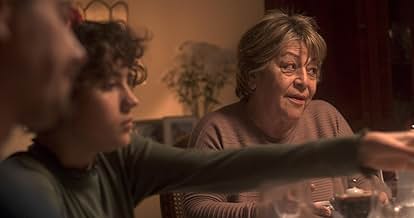VALUTAZIONE IMDb
6,1/10
399
LA TUA VALUTAZIONE
Aggiungi una trama nella tua linguaComing out of he closet is never easy, but the gay son has already come out to his parents. They weren't happy, but they still love him. The son arrives home, only to learn that his partner ... Leggi tuttoComing out of he closet is never easy, but the gay son has already come out to his parents. They weren't happy, but they still love him. The son arrives home, only to learn that his partner has dumped him.Coming out of he closet is never easy, but the gay son has already come out to his parents. They weren't happy, but they still love him. The son arrives home, only to learn that his partner has dumped him.
Recensioni in evidenza
Summary:
This dramatic comedy effectively rounds out a story about the "return to payment" where the reconfiguration of family ties after coming out of the closet is combined with the theme of the prodigal son, professional vocation, future work, reunions and pacts and family management, forming a dynamic that does not necessarily have to do only with inbreeding village environments.
Review:
Manuel (Facundo Gambandé) is an architecture student. The film begins with him saying goodbye to his partner who is going to live in Europe. He then undertakes a trip to his hometown (Villa Mercedes, San Luis) to visit his parents, who are going to celebrate their silver wedding anniversary, and request money to travel and meet with his partner. He had not seen them since he had come out of the closet at a family dinner, which led to an argument and his departure from town on bad terms with his parents.
One of the interesting aspects of the film by Nicolás Teté (also the author of the script) is that, precisely, it does not address the moment of coming out but rather the later; he describes how Manuel (whom his parents nevertheless receive very affectionately when he arrives) tries to rebuild the family bond and put it in new terms; a family with a good time, since his father (Diego de Paula) owns a pasta factory.
Another finding is that Manuel is discovering that the family hides a secret, related to an absence that is increasingly being felt in the story, configuring another family problem that somehow "competes" and interferes with his and repeatedly shifts the leading role. Family that he intended and makes the general picture more complex. In this context, Gambandé composes an endearing and at times naive Manu who demands to be understood and accepted, while disappointments and interference with his purposes do not stop.
Teté presents his story as a dramatic comedy, admirably combining both sides of the story and avoiding melodrama. The comedy tone is partly due to the comic imprint (in the best sense) that the character of the mother María Fernanda Callejón gives to in a great performance, and to that displacement mentioned above that also becomes the dramatic core. There is a series of dialogues that exhibit great naturalness, enhanced by several of them being filmed in long still shots.
With all these components, the film achieves a story about the "return to payment" where the reconfiguration of family ties after coming out of the closet is combined with the theme of the prodigal son, professional vocation, future work, reunions and pacts and family management, forming a dynamic that does not necessarily have to do only with inbreeding village environments.
This dramatic comedy effectively rounds out a story about the "return to payment" where the reconfiguration of family ties after coming out of the closet is combined with the theme of the prodigal son, professional vocation, future work, reunions and pacts and family management, forming a dynamic that does not necessarily have to do only with inbreeding village environments.
Review:
Manuel (Facundo Gambandé) is an architecture student. The film begins with him saying goodbye to his partner who is going to live in Europe. He then undertakes a trip to his hometown (Villa Mercedes, San Luis) to visit his parents, who are going to celebrate their silver wedding anniversary, and request money to travel and meet with his partner. He had not seen them since he had come out of the closet at a family dinner, which led to an argument and his departure from town on bad terms with his parents.
One of the interesting aspects of the film by Nicolás Teté (also the author of the script) is that, precisely, it does not address the moment of coming out but rather the later; he describes how Manuel (whom his parents nevertheless receive very affectionately when he arrives) tries to rebuild the family bond and put it in new terms; a family with a good time, since his father (Diego de Paula) owns a pasta factory.
Another finding is that Manuel is discovering that the family hides a secret, related to an absence that is increasingly being felt in the story, configuring another family problem that somehow "competes" and interferes with his and repeatedly shifts the leading role. Family that he intended and makes the general picture more complex. In this context, Gambandé composes an endearing and at times naive Manu who demands to be understood and accepted, while disappointments and interference with his purposes do not stop.
Teté presents his story as a dramatic comedy, admirably combining both sides of the story and avoiding melodrama. The comedy tone is partly due to the comic imprint (in the best sense) that the character of the mother María Fernanda Callejón gives to in a great performance, and to that displacement mentioned above that also becomes the dramatic core. There is a series of dialogues that exhibit great naturalness, enhanced by several of them being filmed in long still shots.
With all these components, the film achieves a story about the "return to payment" where the reconfiguration of family ties after coming out of the closet is combined with the theme of the prodigal son, professional vocation, future work, reunions and pacts and family management, forming a dynamic that does not necessarily have to do only with inbreeding village environments.
Gayness was incidental to this film, in effect. Manuel thinks that his being gay is the cause of his problems in his family but in reality the real issue is that he has a famous brother whom his parents idolise. It causes a lot of resentment amongst the other three children when the brother is lionised and praised and the remaining siblings are sidelined.
The break up of Manuel and his boyfriend actually is an integral part of the plot contrary to what some people are saying; Without the break up, the ending would not have been possible.
I don't want to get into spoilers, but the situation with Luis and his ex seems contrived and not credible. Someone would have blabbed, especially when the situation became publicly evident.
I have little inspiration to write this review as the film didn't really move me in any deep way. It was fine for an afternoon's viewing. A bit too much filler - more ruthless editing would have been appropriate.
The ending was, for me, unconvincing. It needed major character and viewpoint changes from the parents and was mawkish and sentimental. The epilogue in the kitchen was visibly coming a mile off and I didn't find this any more part of any real development of plot or personality.
OK, I watched it all, but I'm pretty neutral about the whole affair. It just about kept me in front of the screen.
The break up of Manuel and his boyfriend actually is an integral part of the plot contrary to what some people are saying; Without the break up, the ending would not have been possible.
I don't want to get into spoilers, but the situation with Luis and his ex seems contrived and not credible. Someone would have blabbed, especially when the situation became publicly evident.
I have little inspiration to write this review as the film didn't really move me in any deep way. It was fine for an afternoon's viewing. A bit too much filler - more ruthless editing would have been appropriate.
The ending was, for me, unconvincing. It needed major character and viewpoint changes from the parents and was mawkish and sentimental. The epilogue in the kitchen was visibly coming a mile off and I didn't find this any more part of any real development of plot or personality.
OK, I watched it all, but I'm pretty neutral about the whole affair. It just about kept me in front of the screen.
The cinematography is very static, you won't see many cuts or different camera angles, which could be an artistic choice or a budget constaint, but it's not necessatily a bad thing. Speaking of budget constaints, a lot of action is shown off-screen. For example there will be a party but you never see the non-main cast guests, it can be a bit bothersome sometimes, as the movie is not really a "shut off from the outside world" type of movie. There is also a funny sequence at the beginning, where the characters are going out for a jog, and it's obvious that every shot is recorded at the same block.
Sometimes a character will be friendly, just to turn confrontational in the next scene, without indication that the friendliness was fake. This is not necessarily the actors' fault, it's also a script problem. This is also apparent when characters will make a fuss about insignificant things, and you're supposed to take it seriously. Another sign of a posible script problem is when at the end the main character shows some traits that make him seem like an asshole, which I'm not sure if they were intentional.
So far I've been kinds negative, but even with it's faults the movie is enjoyable, you can relate with the characters and situations as they are common to many families, like going back to your hometown, talking about sex to your sibling, having a judgemental grandma, having a dissappointed parent, or having a one sided relationship. The movie does have heart in it.
Sometimes a character will be friendly, just to turn confrontational in the next scene, without indication that the friendliness was fake. This is not necessarily the actors' fault, it's also a script problem. This is also apparent when characters will make a fuss about insignificant things, and you're supposed to take it seriously. Another sign of a posible script problem is when at the end the main character shows some traits that make him seem like an asshole, which I'm not sure if they were intentional.
So far I've been kinds negative, but even with it's faults the movie is enjoyable, you can relate with the characters and situations as they are common to many families, like going back to your hometown, talking about sex to your sibling, having a judgemental grandma, having a dissappointed parent, or having a one sided relationship. The movie does have heart in it.
Watched this during the Tampa International Film Fest. The storyline is good, the lead actor did a great job. Moves a bit slow and clunky at first but comes together nicely. The film is really about relationships with family and their expectations. Liked the ending.
This is a beautiful he told story that only the Spanish or French can do! BIEN HECHO!
Lo sapevi?
- Colonne sonoreTu Veneno
Music by Fernando Lopez Rossi
Performed by Natalia Oreiro
Courtesy of Sony Music Entertainment Inc.
I più visti
Accedi per valutare e creare un elenco di titoli salvati per ottenere consigli personalizzati
- How long is A Skeleton in the Closet?Powered by Alexa
Dettagli
- Data di uscita
- Paese di origine
- Sito ufficiale
- Lingua
- Celebre anche come
- A Skeleton in the Closet
- Azienda produttrice
- Vedi altri crediti dell’azienda su IMDbPro
- Tempo di esecuzione1 ora 43 minuti
- Colore
- Proporzioni
- 1.85 : 1
Contribuisci a questa pagina
Suggerisci una modifica o aggiungi i contenuti mancanti



















